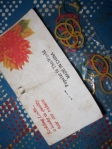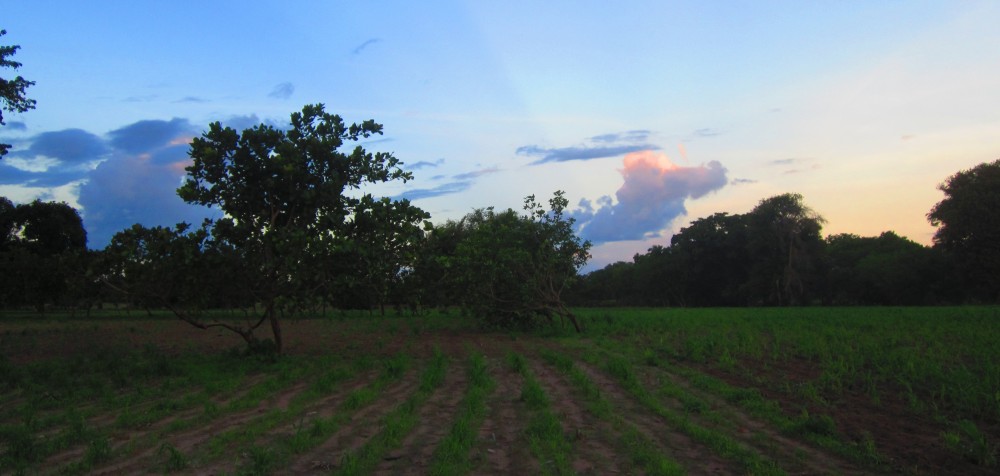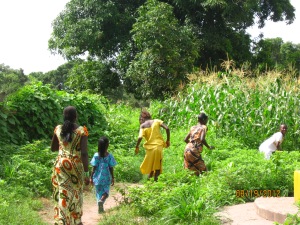26 August 2012
The month of fasting, Sunkaro (suŋ= to fast, karo=month) or Ramadan has come and past. We waited for one new moon, ate six times that day, combining our daily routine with the new schedule of break-fast. We went hungry and learned how to work through and beyond hunger. This is what my brother tells me Allah commanded the fast for, learning to persevere when things are scarce. His explanation was that Africans need to make their bodies strong through fasting. Others told me when they felt hunger it made them think of Allah and this was good. And, they said, they’d think of their duty to those who have less, to those they’d give alms to when the harvests come in.

My Korite flower arrangement. Wildflowers sourced on my morning run. You can take the girl out of Virginia, but you can’t take the garden club out of the girl.
Now I don’t want to sound righteous. I put in my effort, but I was not fully committed. At first, I refused to fast. I’m not a Muslim, it’s not my haaj (way or business). I worked through the afternooning helping a farmer weed his corn. In my bucket bath I poured extra water on my face and let it linger on my lips. Then I sat at my doorstep, litre of water in hand, awaiting not my perception of sunset but when the elders around me raised their cups to drink. For break-fast we eat things, which are usually never present, bread and hot sweet drinks—café, comprised mostly of powdered milk, “tea” a drink from The Gambia whose contents took me an embarrassing amount of time to figure out, and kinkliba, my favorite, a yummy leaf dried and made as a tea. It always tasted great but never as good as at the end of my first fast day.
After gulping down the initial break-fast and as much water as their stomachs could handle, everyone would run off for fourth prayer. On their return we’d drink, not eat, a millet porridge we consume with kalamaas, big ladle-like spoons traditionally made from gourds (mine is purple plastic). Then I’d wait often with my youngest siblings crowding around to read my book with me while everyone else went to mosque. This prayer they said lasted longer because they’d stand and sit thirteen times instead of the usual seven. I’d try to distract the littlest ones from missing their Moms and one day found myself in desperation singing camps songs to them. Those who know my singing voice won’t be surprised that the kids just looked confused while I was going at it and would commence crying with the pauses between songs. Mostly this was nice, reflective family time, but I’d often be ready to sleep before dinner was served.
When the first day past without too much bother I decided fasting was some what better than opening my stomach for the petit lunches that are served to those not fasting (the children, the pregnant, breast feeding and sickly) and getting the taste for hunger. My decision was to fast when I was in village, but not when I was out. With a Sustainable Agriculture sector summit in Tamba and a couple day trips from site, I fasted ten days. Some days I drank water, some I didn’t. On three days I snuck mid-morning tea or a spoonful of peanut butter, so we’ll count seven days as true fasts, decent work for an Episcopalian. And it did make me feel worthy of chicken for breakfast and four bowls of ceebon Korite, the holiday celebrating the end of Ramadan.
Five days earlier was the more interesting holiday, Kitimoo. The last Wednesday of Ramadan everyone breaks into age groups (apparently, I fit with the young brides, 15-18 years old, some only promised off, some recently wed) and go around to each compound singing. The most prominent song screeches “lye lye de lye.” This and other songs are shouted in high-pitched voices until the person you’re visiting gives you money. When the money came there was a jumble of blessings and usually a market-like interaction for change—only small coins are expected and when someone wants to give less than the coins they have, they ask for change. Each group ends caroling at the mosque, where I left them. It was already midnight, but everyone else stayed up until five A.M. lye-lyeing.

Ahminta and Banya, two of the women I stood with just outside the prayer, greeting everyone on their way home.
For Korite, everyone gathers in a big clearing outside to pray in the morning and the rest is mostly about eating and not working. I’d say Kitimoo is to midnight mass as Korite is to Christmas. But a fête it was indeed and I’m glad to be back on a regular schedule. Few events in my life have forced me to change routine and reflect the way Ramadan did and I believe my friends and family here are stronger for it.

“Scolding locks…a leader in quality hair car roducts.” I was sold and how else was I going to get my hair in braids.
Love, M.Cad. who will be in dire need of fashion advice upon her return to the U.S.







Wonderful descriptions, Mares. I’m so proud of you for being able to fast. I’m sure I’d never make it past 2pm.
You crack me up! I’d give that flower arrangement a blue ribbon. So, what is in the Gambian ‘tea’? Thanks for posting, we all gain so much from your writing. xxxxooo
I admire what you are doing. Miss you, Bonnie
Love to see Ashlin’s birth announcement on a wall halfway around the world! Looking forward to you meeting her in person when you get back!
HI Mary. Melissa has set up your blog for me, so I have printed it all off for Olive. She & Matthew love reading all about your experiences. Stay safe. Love to you from all in Wonthaggi
Pam